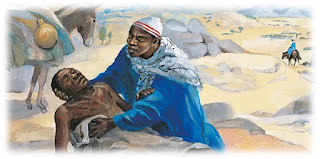Week of Prayer for Christian Unity
We have come a long way since the Octave of Christian Unity was first introduced in 1908. Father Paul Wattson who was born in Maryland, U.S.A. in 1863 was the one who suggested this title, which remained in force until 1963 when it was officially changed to the ‘Week of Prayer for Christian unity’.
Fr. Paul was ordained as an Episcopal priest in 1886. In 1898, in collaboration with an Episcopal sister, Lurana White, he helped to found the Society of the Atonement, known as the Graymoor Franciscans. From the beginning they were committed to promoting Christian unity. Although they were established as an Anglican order, they became Roman Catholic in 1909.
The Octave is kept every year, beginning on January 18th and closing on January 25, the Feast of the Conversion of St. Paul, though Christians in the Southern Hemisphere, more often keep it between the Feast of the Ascension and Pentecost. In January 1964 Pope St. Paul VI and Orthodox Ecumenical Patriarch Athenagoras I of Constantinople met, and embraced, in Jerusalem and in 1965 they lifted the mutual excommunications their churches had imposed in 1054.
Pope Francis marked the anniversary of this momentous reconciliation after his Angelus address on January 6th this year (2024) when he told the crowd in St. Peter's Square that the two leaders had ‘broken down a wall of incommunicability that had kept Catholics and Orthodox apart for centuries’. He went on to say ‘Let us learn from the embrace of those two great men of the church on the path to Christian unity: praying together, walking together and working together.’
Some of the highlights in Vatican ecumenical relations over the past year include: Pope Francis' ecumenical peace pilgrimage to South Sudan on February 3rd 2023, with Anglican Archbishop Welby and the Rev. Iain Greenshields, moderator of the Church of Scotland; The Vatican visit of Coptic Orthodox Pope Tawadros II of Alexandria, Egypt; and Pope Francis' announcement that he added the 21 Coptic martyrs murdered by Islamic State terrorists in 2015 to the Roman Martyrology, the list of saints' feast days; and finally, the ecumenical prayer vigil that preceded the opening of the Synod of Bishops on synodality.
We give thanks that in recent years participation in ecumenical dialogue and shared worship, has changed the outlook of many people towards other churches. Clergy fraternals, ecumenical prayer groups, Lent courses and study groups have become so usual that it can become easy to forget that we are still on a journey towards full unity, but it is something we should always bear in mind.
Each year Christians in different countries choose a theme and prepare the prayers and reflections for the ‘Week of Prayer for Cristian Unity’. This year they have been prepared by an ecumenical group of Christians in Burkina Faso and they focus on the theme, "You shall love the Lord your God … and your neighbour as yourself". There has been a serious security crisis in Burkina Faso since 2016 and Christians have been targeted in jihadist terrorist attacks, forcing hundreds of churches to close. Yet, the situation has prompted Christian communities not only to pray for peace, but to work together to care for people displaced by the fighting and to promote Christian-Muslim dialogue.




Comments
Post a Comment